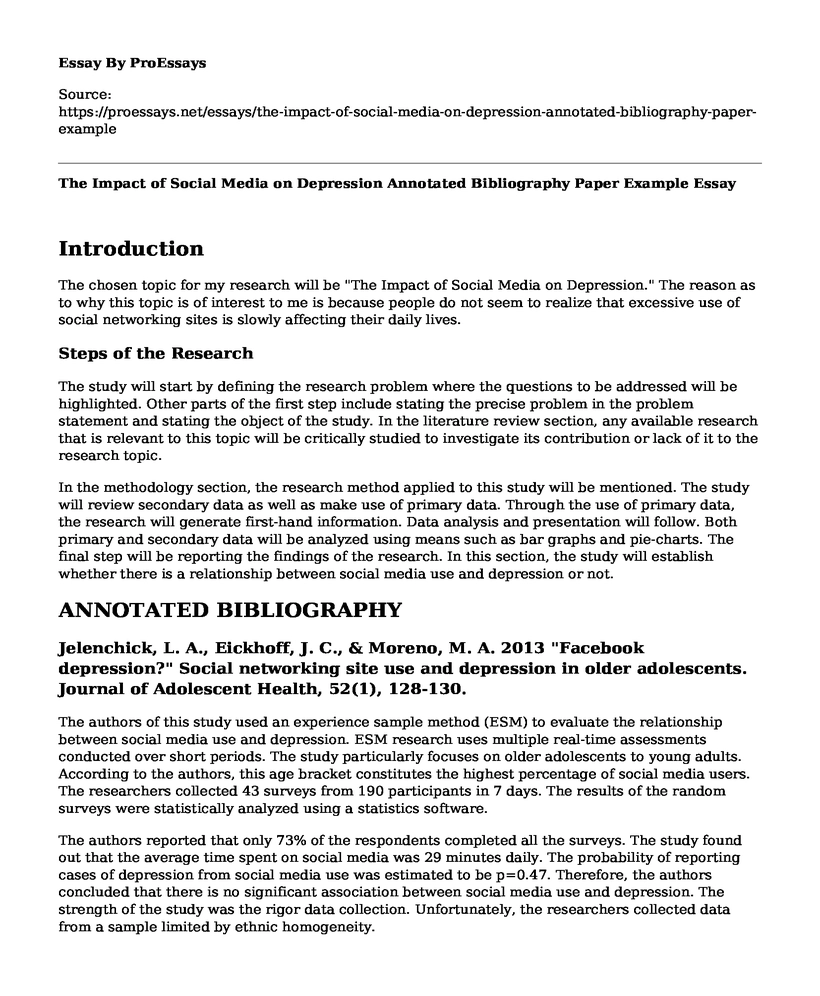Introduction
The chosen topic for my research will be "The Impact of Social Media on Depression." The reason as to why this topic is of interest to me is because people do not seem to realize that excessive use of social networking sites is slowly affecting their daily lives.
Steps of the Research
The study will start by defining the research problem where the questions to be addressed will be highlighted. Other parts of the first step include stating the precise problem in the problem statement and stating the object of the study. In the literature review section, any available research that is relevant to this topic will be critically studied to investigate its contribution or lack of it to the research topic.
In the methodology section, the research method applied to this study will be mentioned. The study will review secondary data as well as make use of primary data. Through the use of primary data, the research will generate first-hand information. Data analysis and presentation will follow. Both primary and secondary data will be analyzed using means such as bar graphs and pie-charts. The final step will be reporting the findings of the research. In this section, the study will establish whether there is a relationship between social media use and depression or not.
ANNOTATED BIBLIOGRAPHY
Jelenchick, L. A., Eickhoff, J. C., & Moreno, M. A. 2013 "Facebook depression?" Social networking site use and depression in older adolescents. Journal of Adolescent Health, 52(1), 128-130.
The authors of this study used an experience sample method (ESM) to evaluate the relationship between social media use and depression. ESM research uses multiple real-time assessments conducted over short periods. The study particularly focuses on older adolescents to young adults. According to the authors, this age bracket constitutes the highest percentage of social media users. The researchers collected 43 surveys from 190 participants in 7 days. The results of the random surveys were statistically analyzed using a statistics software.
The authors reported that only 73% of the respondents completed all the surveys. The study found out that the average time spent on social media was 29 minutes daily. The probability of reporting cases of depression from social media use was estimated to be p=0.47. Therefore, the authors concluded that there is no significant association between social media use and depression. The strength of the study was the rigor data collection. Unfortunately, the researchers collected data from a sample limited by ethnic homogeneity.
Lin, L. Y., Sidani, J. E., Shensa, A., Radovic, A., Miller, E., Colditz, J. B., ... & Primack, B. A. (2016). Association between social media use and depression among US young adults. Depression and anxiety, 33(4), 323-331.
With the notable increase of social media among the American young adults, the authors sought to clarify whether there is an association between its use with mental well-being. To do so, the researchers used a nationally representative sample of 1,787 young adults aged between 19 and 32 years. Recruitment was done randomly via a digital dialing and address-based sampling. The researchers assessed social media use by means of self-reported total time per day and visits per week. Patient-Reported Outcomes Measurement Information System (PROMIS) was used to determine depression.
The researchers established that respondents in the highest quartile of total time per day spent on social media significantly increased their chances of suffering from depression. This revelation led to the conclusion that social media use is to some extent linked to increased depression. The researchers recommend identifying the mechanisms of the apparent association to inform workable interventions to this issue.
REFERENCES
Lin, L.Y., Sidani, J.E., Shensa, A., Radovic, A., Miller, E., Colditz, J.B., Hoffman, B.L., Giles, L.M. and Primack, B.A., 2016. Association between social media use and depression among US young adults. Depression and anxiety, 33(4), pp.323-331.
Jelenchick, L.A., Eickhoff, J.C. and Moreno, M.A., 2013. "Facebook depression?" Social networking site use and depression in older adolescents. Journal of Adolescent Health, 52(1), pp.128-130.
Cite this page
The Impact of Social Media on Depression Annotated Bibliography Paper Example. (2022, Nov 20). Retrieved from https://proessays.net/essays/the-impact-of-social-media-on-depression-annotated-bibliography-paper-example
If you are the original author of this essay and no longer wish to have it published on the ProEssays website, please click below to request its removal:
- What Is Architecture Essay Example
- The Life and Works of Chopin Essay
- Global Predominance of Depression Essay
- Essay Sample on Mental Health Laws
- Essay Example on Latino and Hispanic Americans: A Diverse Group in America
- Essay Sample on The Piano: Strings, Keys, and a World of Musical Joy
- Essay Sample on Detroit 48202: 30 Years of Intensification, Decease & Rebirth







